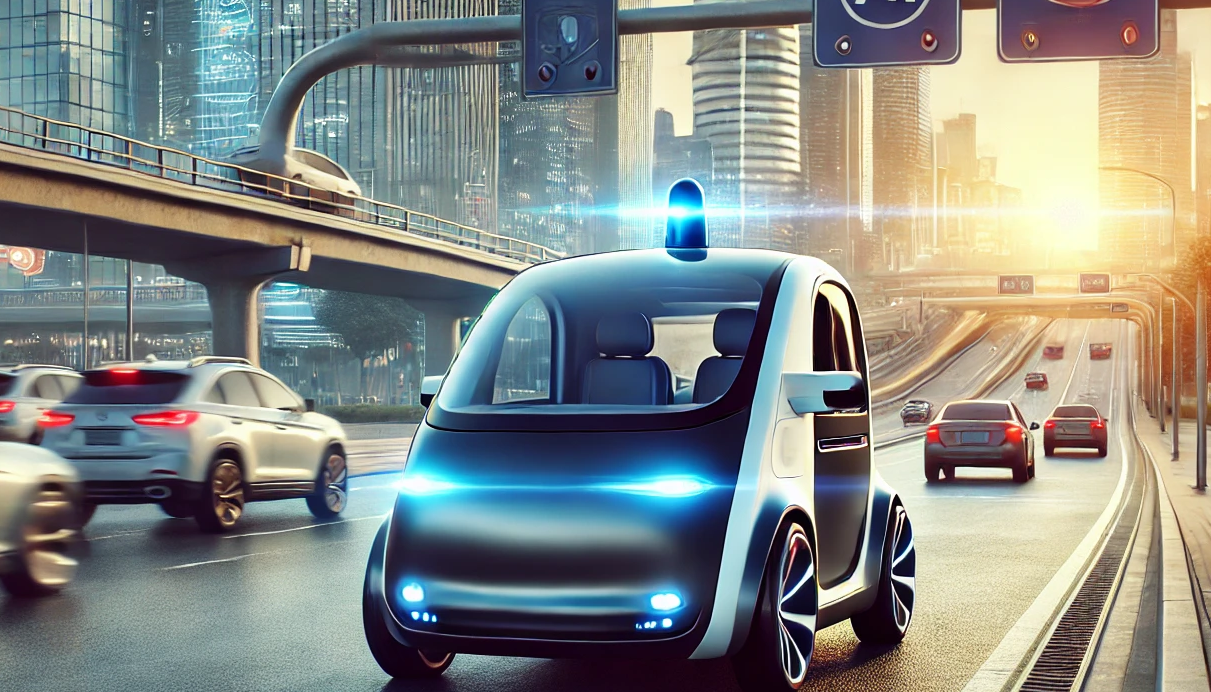
What once seemed like a concept from science fiction cars that drive themselves is now becoming a reality, thanks to rapid technological advancements. Autonomous vehicles (AVs) are no longer just prototypes; they’re starting to reshape how we think about transportation. Powered by breakthroughs in artificial intelligence, sophisticated sensors, and advanced connectivity, these self-driving cars promise to revolutionize the way we move, making transportation safer, more efficient, and environmentally friendly. But what exactly are autonomous vehicles, and how will they redefine the roads of tomorrow?
What Exactly Are Autonomous Vehicles?
At the heart of autonomous vehicles is an ecosystem of cutting-edge technology: AI-driven systems, cameras, radar, and sensors work in unison to allow these vehicles to navigate without human intervention. They rely on real-time data processing and machine learning algorithms to make decisions adjust speed, avoid obstacles, and respond to changing traffic conditions.
There are various levels of autonomy, ranging from basic driver assistance systems, like adaptive cruise control, to fully self-driving cars that require no human involvement. Companies like Tesla, Waymo, and Uber are at the forefront of developing this technology, and automakers worldwide are racing to incorporate autonomous capabilities into their fleets.
The Major Benefits of Autonomous Vehicles
- Boosting Safety
The most compelling argument for autonomous vehicles is their potential to drastically reduce accidents. Human error accounts for the majority of road incidents, but AVs are designed to react faster and more accurately to hazards. Using sensors to detect potential obstacles and AI to process data in milliseconds, AVs can avoid collisions more effectively than human drivers.
- Easing Traffic Congestion
Autonomous vehicles are poised to streamline traffic flow. By communicating with one another and adjusting to real-time conditions, AVs can reduce bottlenecks and improve overall efficiency on the road. In an AV-dominated world, traffic jams could become a relic of the past, offering commuters shorter travel times and less stress.
- Eco-Friendly Transportation
As many AVs are being designed as electric vehicles, they offer significant environmental benefits. Fewer emissions, coupled with more efficient driving patterns, can reduce the carbon footprint of the transportation sector. This combination could make autonomous vehicles a vital part of the fight against climate change.
- Empowering Accessibility
Autonomous vehicles could be a game-changer for people who are unable to drive due to age, disability, or other factors. By providing a reliable, independent mode of transportation, AVs can offer greater freedom and mobility to individuals who would otherwise be dependent on others for transportation.
How Autonomous Vehicles Will Transform Industries
- Revolutionizing Transportation and Logistics
The logistics and transportation sectors stand to gain immensely from autonomous vehicle technology. Self-driving trucks and delivery vans can operate around the clock without the need for breaks, enabling faster shipping times and reduced operational costs. Supply chains could become more efficient, changing the landscape of global trade and commerce.
- The Ridesharing Revolution
Companies like Uber and Lyft are heavily investing in autonomous technology, envisioning fleets of self-driving taxis. This could significantly reduce the cost of ridesharing services, making them more affordable and accessible to a broader audience. With no human drivers, the risk of human error drops, making these services safer for passengers.
- Insurance and Liability Shifts
As autonomous vehicles reduce accidents, the insurance industry will need to adapt. Fewer collisions mean lower premiums for consumers, but it also shifts liability toward the manufacturers of AVs and the software developers. The landscape of vehicle insurance may move away from individual coverage toward product liability models.
- Reshaping Urban Planning
The rise of AVs could fundamentally alter the design of our cities. With less need for parking lots and garages, urban spaces could be repurposed for parks, housing, or public amenities. As personal car ownership declines and shared AVs become more common, cities may also experience less congestion, allowing for smarter, more sustainable urban development.
The Roadblocks Ahead: Challenges Facing Autonomous Vehicles
While the potential of autonomous vehicles is clear, significant hurdles remain. One of the primary challenges is regulatory. Governments worldwide are still figuring out how to create safety standards and liability frameworks for AVs. This regulatory uncertainty is slowing down the widespread deployment of self-driving cars.
The technology itself also faces obstacles. Despite impressive advancements, AVs still struggle in complex environments, such as inclement weather, construction zones, or unpredictable human behavior. Ensuring that autonomous vehicles are reliable in every scenario is a major focus for developers.
There are also ethical considerations. In life-threatening situations, how should an AV make decisions about minimizing harm? These moral dilemmas present a significant challenge for programmers and ethicists as they shape the algorithms that will govern self-driving cars.
The Future of Autonomous Vehicles: A New Transportation Era
The road ahead for autonomous vehicles is paved with opportunity, but it will take time before they become a ubiquitous presence in our daily lives. Experts predict that we’ll first see more widespread use of AVs in controlled environments, like highways or designated urban areas, within the next decade. As technology matures and regulatory frameworks solidify, autonomous vehicles will become common on our roads.
The potential impact of AVs extends far beyond personal transportation. Industries like logistics, public transit, and ridesharing are set to be revolutionized. These vehicles will offer cleaner, safer, and more efficient alternatives to the status quo, transforming how we think about mobility and urban living.
A Self-Driving Future Awaits
Autonomous vehicles are poised to redefine transportation as we know it. Offering enhanced safety, improved efficiency, and reduced environmental impact, AVs promise to reshape industries and change how we move through the world. Although challenges remain in regulation, technology, and ethics, the future of AVs looks bright. As development continues and adoption grows, autonomous vehicles are set to become a cornerstone of the transportation systems of tomorrow ushering in a new era of mobility and sustainability.


